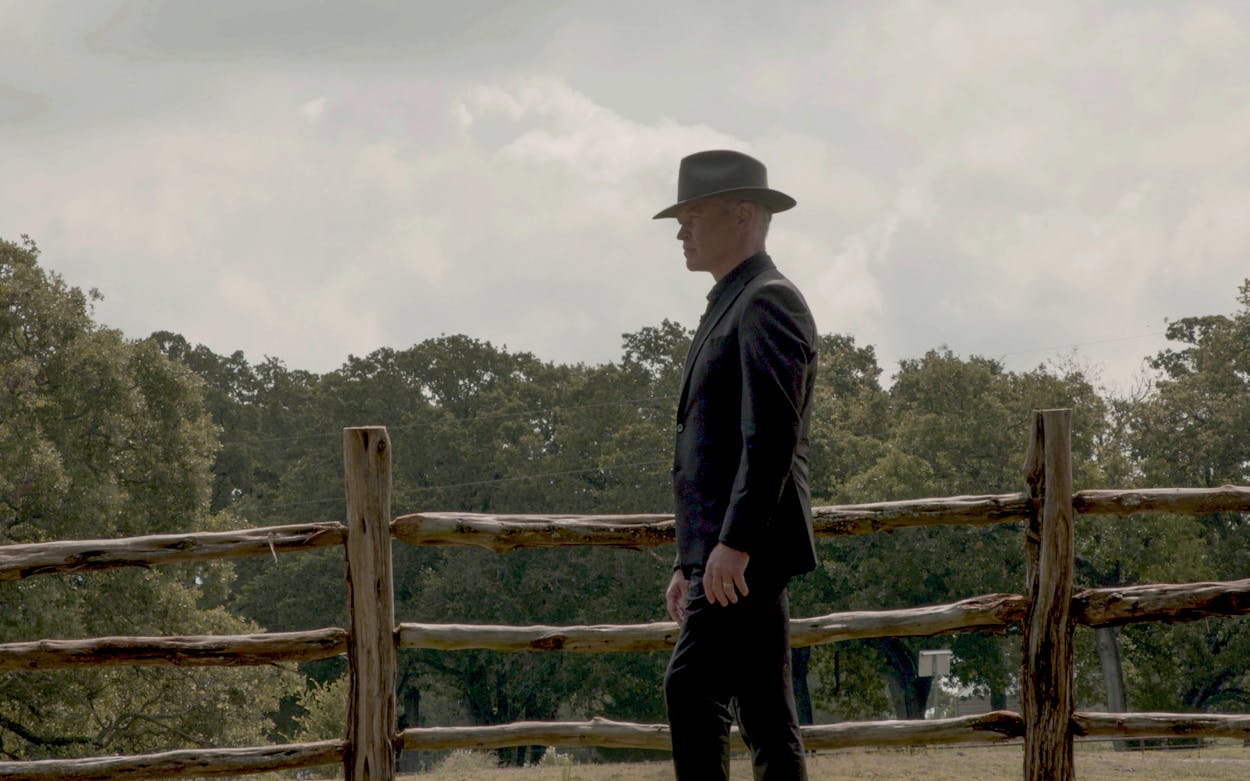Red Stone was among the first films to enter production during the COVID-19 lockdown of 2020, a fact that is touted proudly in its press kit. This bit of trivia is notable for two reasons. One is that the thriller, the latest from Fort Worth writer-director Derek Presley, offers a living testament to the perseverance of its producers, cast, and crew—and perhaps, in some broader way, that of all mankind. The second is that once you’re made aware of the circumstances it was made under, it becomes near impossible not to notice just how much of Red Stone takes place in open fields, with its actors socially distanced and often facing in the same direction, aiming their dialogue (and potentially infectious aerosols) away from one another. Scenes in which two or more characters occupy the same frame are rare; they are most often captured alone, talking directly to the camera, which lends the entire film a vibe of arid detachment. Although Red Stone never quite reaches the absurdities of Saturday Night Live’s pandemic soap opera sketch, it provides a similar time capsule of what filmmaking was like in those panicked early days, as crews grappled with strange new safety protocols and their own sublimated fear.
Unfortunately, that’s about the only thing that feels distinctive about Red Stone, which arrives in select theaters and on video-on-demand platforms on December 3. The thriller, filmed in and around Corsicana, stars Neal McDonough as an existentially weary hitman named Boon who’s tasked with hunting down a teenager, Motley Adams (Dallas actor Dash Melrose), after Motley witnesses his brother’s murder at the hands of a Southern crime boss named Jed (The Walking Dead’s Michael Cudlitz). It’s a welcome lead role for McDonough, a fine character actor who’s brought subtle menace to shows like Yellowstone and Justified, where he’s often played guys who hide a streak of sadism behind their natty suits and pearly white smiles. But here he largely coasts on those creepy charms as the stoic yet sensitive Boon, carrying a plot that feels like a particularly forgettable episode from one of those premier TV dramas.
There’s some business with a stolen ruby as well—the “red stone” of the title—which Motley has made off with and which Jed wants returned. Still, the significance of this MacGuffin is never fully explained and, in the end, it’s more or less abandoned. What gives Red Stone its fuller, ostensibly cinematic scope is the emotional grip of Boon’s late-career crisis: we meet him as he’s grieving over his a recent death in his own family, a loss that has left Boon questioning whether his heart is really in hired killing anymore. Boon naturally empathizes with Motley, so he finds himself reluctant to pull the trigger during their several close encounters, allowing the kid to escape enough times that, eventually, Boon realizes he actually wants to save him.
Boon is a hit man with a heart, in other words, a hoary old trope that Red Stone serves up alongside a smattering of similar clichés about corrupt cops, FBI stings, and (in the words of one side character) “some old-school Dixie Mafia-type s—t.” It’s repetitive, predictable stuff, though none of this would matter if the film allowed itself to have any fun with it, or if its main characters were just slightly more compelling. Melrose, who resembles some missing link between Miles Teller and Shia LaBeouf, gives Motley a louche, slack-jawed charm, but whatever spark he has is snuffed out early on by a script that asks him to do little more than weep and run. As the burly Jed, Cudlitz sports intricately tattooed hands and a foot-long goatee, but everything else about his performance feels restrained to the point of being listless. McDonough similarly underplays behind his crisp suits and black fedora, largely conveying Boon’s raging internal conflict through a series of pained sighs. You know that Boon must really be going through something because after he kills someone he’ll go and stare despairingly at a nearby wall. It’s clear that Presley finds Boon to be a captivating protagonist, given that he’s already deep into filming a sequel about the reformed hit man’s next reluctant adventure. But eventually all of Boon’s self-serious pondering suffocates the entire movie, draining whatever pleasure you might have gotten out of gratuitous violence.
Of course, Red Stone isn’t just about bullets and bloodshed. It aspires to be a philosophical rumination on the duality of man, and on the capacities for evil and mercy that commingle uneasily within us all. This is a theme shored up not only by Boon’s character arc, but by scenes of Jed cuddling his infant grandchild and getting wistful over pancakes and sunrises. Yet despite those pretensions, the film never quite rises above its boilerplate trappings. As a director, Presley has a confident, if workmanlike, command of the camera, and he gives Corsicana’s farmlands and foundries an aura of sun-dappled danger. But his dialogue is largely tin-eared tough-guy patter; his characters speak almost exclusively in hostile barbs and exhortations to “shut the f— up.” It almost goes without saying that female actors are nearly nonexistent in Red Stone, reduced to playing the sort of tertiary moms, girlfriends, and waitresses who can be dispatched quickly so the men can get on with their manly business.
While it was made under some truly historic circumstances, Red Stone feels timelessly generic. Still, maybe there’s something reassuring in this as well: faced with a global pandemic and with their entire industry teetering on collapse, its producers bravely soldiered on, determined to make the kind of middling action film that has reliably filled basic cable since the eighties, right down to its score of squalling electric guitar. What more of a “return to normal” could you ask for?






